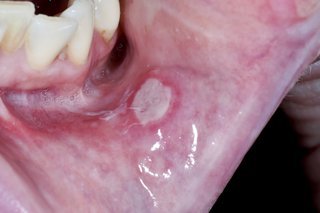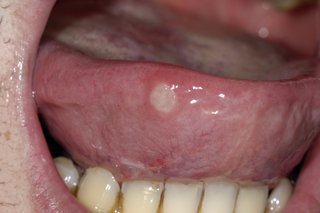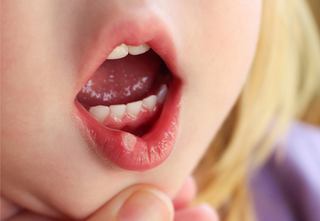Mouth Ulcer in Newborn Baby
Mouth ulcers are common and should clear up on their own within a week or 2.
They're rarely a sign of anything serious but may be uncomfortable to live with.
They can be very painful for babies and children and often develop during times of stress. They may prevent your child from eating and drinking.
Check if it's a mouth ulcer
Mouth ulcers are usually small, creamy-white and appear on the:
- inside of the mouth
- lips
- gums
- tongue
These types of mouth ulcers are known as canker sores (aphthous ulcers).



You may have more than one ulcer at a time and they can change in size.
Mouth ulcers are not contagious. But sometimes they are a symptom of a contagious illness.
Traumatic ulcer
A traumatic ulcer can happen after an injury. Sometimes the cause is biting the inside of your cheek or a rough tooth rubbing against your cheek.
A traumatic ulcer usually starts as a sore patch on the inside of the cheek. It gets bigger and turns into a painful yellow crater. It can take up to 14 days to heal.
Cold sores
Mouth ulcers are different to cold sores. Cold sores are white, painful blisters. They often start with a tingling, itching or burning sensation.
They usually appear on or around your lips but can also appear:
- on the roof of the mouth
- on the gums
- inside of the cheeks
The cause of cold sores is the cold sore virus. The virus can be dangerous, or even fatal, for young babies. The risk is highest in the first 4 weeks after birth.
Sign of another infection
If you or your child have several mouth ulcers, this can be a symptom of:
- hand, foot and mouth disease - a contagious illness that also causes a rash on the hands and feet
- oral lichen planus - a condition that causes a white, lacy pattern inside the cheeks
- thrush infection - a fungal infection that can cause white curd-like blisters
Causes of mouth ulcers
The causes of single mouth ulcers are usually things you can try to avoid, such as:
- biting the inside of your cheek
- badly fitting dentures, braces, rough fillings or a sharp tooth
- cuts or burns while eating or drinking – for example, hard food or hot drinks
- damaging your gums with a toothbrush or irritating toothpaste
- feeling tired, stressed or anxious
Sometimes the cause is something you cannot always control, such as:
- hormonal changes – such as during pregnancy
- your genes – some families get mouth ulcers more often
- a long-term condition – such as inflammatory bowel disease (IBD), coeliac disease or Behçet's disease
- a vitamin B12 deficiency or an iron deficiency
- medications – including some anti-inflammatories or beta-blockers
Treatment of mouth ulcers
Mouth ulcers need time to heal and there is no quick fix.
Avoiding things that irritate your mouth ulcer may help to:
- speed up the healing process
- reduce pain
- reduce the chance of it returning
There are things you can do to stop the ulcer returning.
Do
-
use a soft-bristled toothbrush
-
drink cool drinks through a straw
-
eat softer foods
-
get regular dental check-ups
-
eat a wide variety of healthy foods
Don't
-
do not eat very spicy, salty or acidic food
-
do not eat rough, crunchy food, such as toast or crisps
-
do not drink very hot or acidic drinks, such as fruit juice
-
do not use chewing gum
-
do not use toothpaste containing sodium lauryl sulphate
Treatment from a pharmacist
A pharmacist can recommend a treatment to heal ulcers, prevent infection or reduce pain.
For example:
- antimicrobial mouthwash
- a painkilling mouthwash, gel or spray
You can buy these without a prescription but they may not always work.
Treating mouth ulcers in babies and children
Give your child pain relief medicine such as children's paracetamol if they are in pain. Always follow the instructions on the packet.
Make sure your child is drinking enough fluids like water and milk. Try offering them cold drinks through a straw if their mouth is very sore.
Offer them cool, soft foods to eat. Rough foods like toast or cereal flakes might hurt their mouth.
Avoid acidic fruits and fruit juices. These can sting their mouth.
Offer your child frequent breastfeeds. If you are bottle feeding your baby, make sure you are using the correct bottle teat. This will help to avoid any trauma to the inside of your baby's mouth.
Treatment from your GP
Contact your GP if your child has symptoms of dehydration.
Non-urgent advice: Contact your GP if the mouth ulcers:
- are very painful or red – this may be a sign of an infection
- look like white curds and do not wipe off - this may be thrush
- come back regularly
- last longer than 3 weeks
Most mouth ulcers are harmless. But a long-lasting mouth ulcer is sometimes a sign of mouth cancer. It's best to get it checked.
Your GP can prescribe treatments such as corticosteroid lozenges.
If the ulcers keep coming back, your GP may send you or your child for blood tests. This is to see if there is an underlying cause, such as coeliac disease, or being low in certain vitamins or iron.
Content supplied by the NHS and adapted for Ireland by the HSE

Source: https://www2.hse.ie/conditions/mouth-ulcers/
0 Response to "Mouth Ulcer in Newborn Baby"
Post a Comment